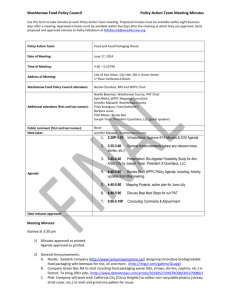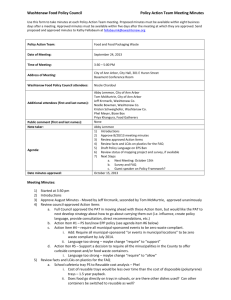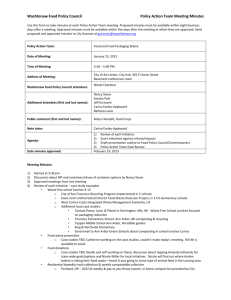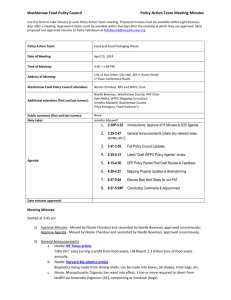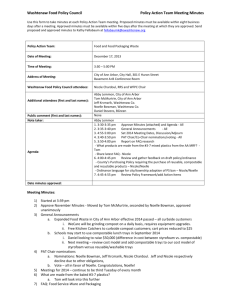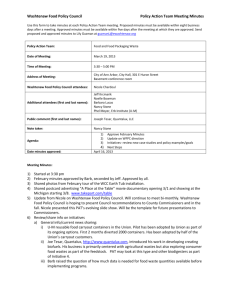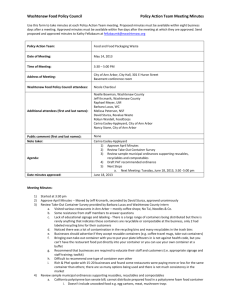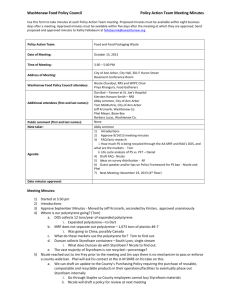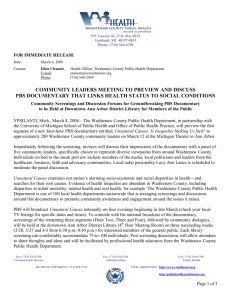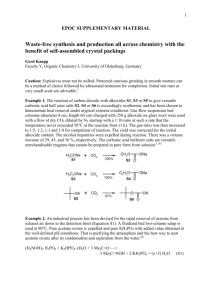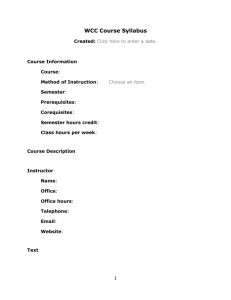February 19, 2013
advertisement
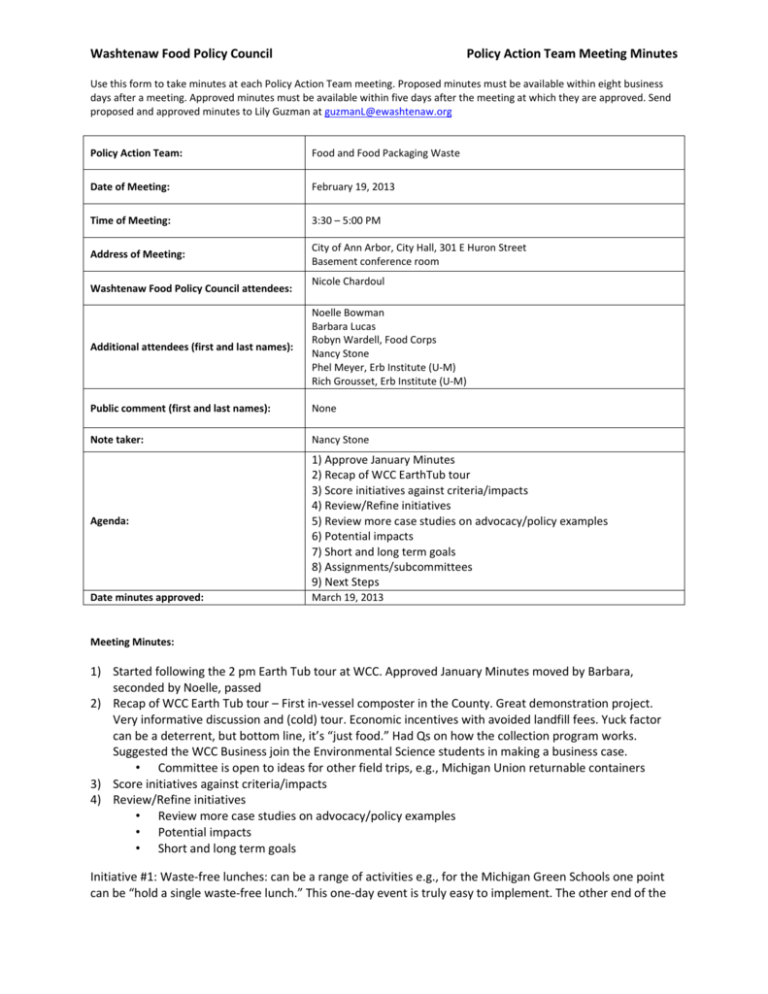
Washtenaw Food Policy Council Policy Action Team Meeting Minutes Use this form to take minutes at each Policy Action Team meeting. Proposed minutes must be available within eight business days after a meeting. Approved minutes must be available within five days after the meeting at which they are approved. Send proposed and approved minutes to Lily Guzman at guzmanL@ewashtenaw.org Policy Action Team: Food and Food Packaging Waste Date of Meeting: February 19, 2013 Time of Meeting: 3:30 – 5:00 PM Address of Meeting: City of Ann Arbor, City Hall, 301 E Huron Street Basement conference room Washtenaw Food Policy Council attendees: Nicole Chardoul Additional attendees (first and last names): Noelle Bowman Barbara Lucas Robyn Wardell, Food Corps Nancy Stone Phel Meyer, Erb Institute (U-M) Rich Grousset, Erb Institute (U-M) Public comment (first and last names): None Note taker: Nancy Stone Agenda: 1) Approve January Minutes 2) Recap of WCC EarthTub tour 3) Score initiatives against criteria/impacts 4) Review/Refine initiatives 5) Review more case studies on advocacy/policy examples 6) Potential impacts 7) Short and long term goals 8) Assignments/subcommittees 9) Next Steps Date minutes approved: March 19, 2013 Meeting Minutes: 1) Started following the 2 pm Earth Tub tour at WCC. Approved January Minutes moved by Barbara, seconded by Noelle, passed 2) Recap of WCC Earth Tub tour – First in-vessel composter in the County. Great demonstration project. Very informative discussion and (cold) tour. Economic incentives with avoided landfill fees. Yuck factor can be a deterrent, but bottom line, it’s “just food.” Had Qs on how the collection program works. Suggested the WCC Business join the Environmental Science students in making a business case. • Committee is open to ideas for other field trips, e.g., Michigan Union returnable containers 3) Score initiatives against criteria/impacts 4) Review/Refine initiatives • Review more case studies on advocacy/policy examples • Potential impacts • Short and long term goals Initiative #1: Waste-free lunches: can be a range of activities e.g., for the Michigan Green Schools one point can be “hold a single waste-free lunch.” This one-day event is truly easy to implement. The other end of the Washtenaw Food Policy Council Policy Action Team Meeting Minutes Use this form to take minutes at each Policy Action Team meeting. Proposed minutes must be available within eight business days after a meeting. Approved minutes must be available within five days after the meeting at which they are approved. Send proposed and approved minutes to Lily Guzman at guzmanL@ewashtenaw.org spectrum would be to have composting and recycling at all lunchtimes, which requires intensive supervision and student volunteers. Focus can be at the student classroom level, teacher education, food services, community education. Example is from Oak Hills Elementary School in Ventura County for Zero-waste lunch. The Center for Ecoliteracy in California has a good toolbox. Important to include a waste audit. Successful programs involve students. Another example had students receive a cloth napkin, reusable beverage bottle, and sandwich box. Had math problems for how many bottles saved by using refillable. Thurston, Northside and King Elementary schools in Ann Arbor have a daily recycling and food waste composting at all lunches. Robyn is putting together a healthy lunch, waste-free lunch set of materials that she can provide for this task force. Initiative #3: Food donations: Noelle researched on food donations for animal feed. Nothing in Michigan, but some programs in MN and Omaha, NE (farmer using stale bread for creating animal feed). Federal laws have no restrictions on non-meat food donations; but stringent laws on animal-based foods (e.g., cooking at x degrees for an hour, storage requirements). PA has a network of hog farmers using breads and canned foods. Donations for human consumption are legally covered by Good Samaritans Act. Food Gatherers could use help with year-round composting service. Initiative #4: Update from City of Ann Arbor, full plate scrapings is under discussion with WeCare Organics at Ann Arbor’s open windrow site, which would be able to handle this range and quantity of materials from single-family residents. Program start-up timing includes decisions include adjustment of contract to pay a higher tip fee since the food waste will require more on-site equipment and staff time management. And there will need to be contracts for ordering optional kitchen collectors to support best management practices. Before offering year-round compost collection, city will need to demonstrate affordable need for winter collection. Nicole mentioned that it is possible to provide residential food carts pickups once/month in the winter. Initiative #5: Updates from U-M with the Go Blue Box at the Michigan Union: piloting for a year. Students are interested in public-private partnership for expanding reusable containers to more restaurants. From city, looking for incentives to businesses to encourage reuse of containers. Qs: Any permits needed for vehicle pickups from streets, alleys? Placement of collection bins on streets? (could start with talking with Susan Pollay, DDA.) 5) Assignments/subcommittees People will work on each of their areas of passion that align with the identified six initiatives. Waste-free lunch – Robyn Food waste prevention -- Catherine Dyson and Barbara Lucas (Nancy with possible intern on EPA) Food donation – Noelle Biweekly trash/weekly compostable—Nicole Containers—Rich and Phel for reuseables project. Reuse/compost/recycle containers listed in draft City A2 new solid waste plan. Zero waste events – open, possibly RAA’s new zero waste staff person, or links to existing online guides 6) Next Steps—work on assignments. Next Meeting: March 19th, 3:30 pm. 7) Adjourned at 5:15 p.m.
